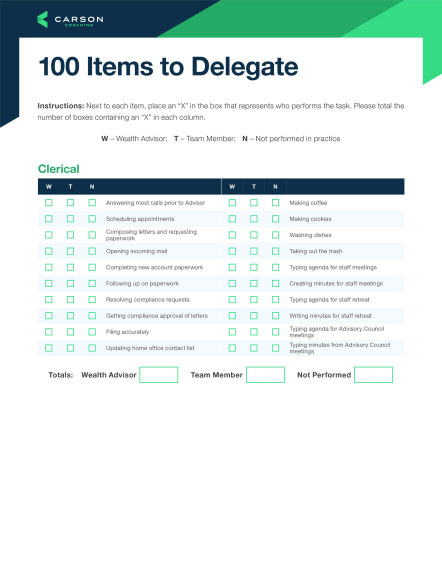What do all of your clients have in common – whether they signed up yesterday or have been with you for two decades? They trust you to act in their best interests. Or, at least, they should.
This comes at a time when 65 percent of consumers say they mistrust the financial services industry to some degree. So how do we deliver maximum value and prove we are deserving of the public’s trust? It starts with transparency, and it leads to eliminating excessive fees. Trust hinges on being open about the fee you charge, why that fee exists and what they are receiving for that investment in their financial future.
Learn more about Carson’s investment strategies through this fact sheet.
This isn’t news to you. Financial services has shifted its battleground from a “fee war” to a “value war.” But in the process of that transition, we’ve faced many obstacles: fee transparency, adding alpha, verifying value, margin compression, and delivering seamless proactive service. Navigating those obstacles poorly can result in disgruntled clients, legal ramifications or even closing shop altogether.
So, how do advisors eliminate excessive fees and provide optimal value within a margin that keeps their business sustainable, all while keeping their client’s interests ahead of their own? It starts by understanding the fundamentals of fee compression.
Understanding Fee Compression
Advisors are overwhelmed by product proliferation in the fund industry, where even the number of choices for the new product on the block – ETFs – exceeds 1,000. Meanwhile, every investment carries its own set of fees that make it difficult to know what’s best for your client without swallowing enormous costs in the process.
Well, it’s not a simple answer, but it begins with a mindset. One of delivering maximum value while acknowledging the realities of fee compression. Try and think of fee compression like a retractable t-ball tee. This fee-based T-ball stand starts at the bottom and expands up, one section at a time, with advisor fees being the smallest section at the top.
- Trading fees
- Index fund fees
- Asset allocation fees
- Active management fees
- Advisor fees
Each retractable section contracts and expands independently of the others, but each affects the overall height of the stand – the total fees communicated to the client. And every time that tee changes in size, advisors feel the ripple effect while still dealing with the realities of running a business and keeping their margins healthy.
Advisors must minimize the effects of fee compression and clearly communicate this point to their clients. This is why we often talk about the third level of trust at Carson. The first level of trust is the most basic – our clients trust we aren’t going to mishandle their money. The second level is acting as a fiduciary, always putting our clients’ interests ahead of our own. The third level of trust, however, is hardest of all for advisors to attain – to anticipate their client’s need before the client even knows it exists.
Partner, Acquire or Hire
Our profession needs to think beyond “what do I offer my client.” It can be equally important what you help a client avoid – like excessive fees that occur at the bottom of the T-ball tee with trading fees and index fund fees. We want to deliver unmistakable value, and in doing that we need to paint the whole picture.
See all the ways partnering with Carson can help grow your firm.
You can start this process by looking at the all-in cost of your investment models, trading fees, and ecosystem. Then, explore ways to reduce or eliminate those fees, or find a strategic partner who does that for you.
Investigate Your Investment Model
Take a look at the all-in cost of every strategy within your investment model and see if there are cheaper options. You can automate this process or you can do it manually. Within our ecosystem, we are always monitoring fees and adjusting as needed.
Partner with or Acquire a Strategy
One way that we looked to help our clients – and the clients of our partner firms – was by finding a low-volatility, GIPS-compliant strategy to add to our ecosystem. With our investment strategies, sometimes we partner, sometimes we acquire, and sometimes we hire, but we’re always adding strategies with one thing in mind: no additional fees. I
n this example, we chose not to partner with a firm, but rather to acquire QBI, a rules-based, low-volatility suite containing a total of 17 track records. QBI brought a popular smart-beta strategy to our ecosystem, offering advisors more flexibility and introducing a factor-based model built on purely passive ETF strategies and complementing existing ETF and active stock positions. Most importantly, though, there are no additional costs to our partner firms. We could have partnered with QBI and added 35 basis points, but we instead chose to acquire the firm and swallow the cost to help our partners and their clients.
Build a Strategy to Meet Client Needs
We always want to meet the needs of Carson Partner firms, along with the needs of their clients. A recent example of this was feedback from our partners requesting structured notes. Our due diligence left us with a bad taste. We found the typical structured note has very low liquidity, had very high relative fees, and little to no transparency.
So, we created a strategy of our own: the Mission Series. The Mission Series was created to provide the return profile of structured notes without internal fees. This strategy provides upside participation with downside protection for clients. Our Mission Series offers a more structured return payoff similar to structured notes, but it has daily liquidity, maximizes the return potential to the client (not the provider), and is completely transparent so the client knows exactly what they’re getting.
Show Why You’re Trusted
You face the battle of fee compression in the background, without your clients knowing what you’re doing to help them. So the next step is to effectively communicate that value. Explain the investment strategies that fit into your client’s portfolio, what the fees are on those strategies, and then prove that you’re doing your part to help keep excessive fees at bay.
Are you doing the most you can to eliminate excessive fees? You can learn more about partnering with Carson, and our investment team will get to work help you meet the needs of your clients. Interested in finding out more? Set up a consultation today!


